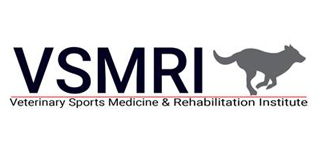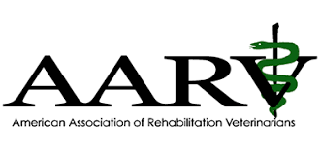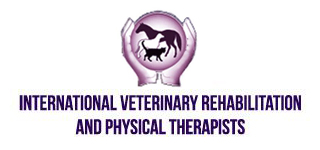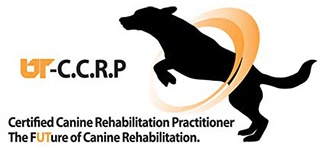Dog Rehabilitation
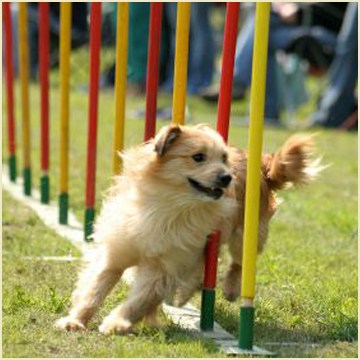 We probably all know someone who has had knee or hip replacement surgery. The next day they are involved in passive exercise and are in physical therapy for weeks or months to ensure the best outcome possible. The mechanics of healing are generally the same for our dogs and cats, and the days of three weeks in a crate after surgery, are being replaced with early physical rehabilitation for a faster and stronger recovery. Research indicates loss of muscle mass begins after 72 hours of inactivity which is why careful and correct motion is important. An appropriate course of early dog rehabilitation prevents this loss and speeds overall recovery.
We probably all know someone who has had knee or hip replacement surgery. The next day they are involved in passive exercise and are in physical therapy for weeks or months to ensure the best outcome possible. The mechanics of healing are generally the same for our dogs and cats, and the days of three weeks in a crate after surgery, are being replaced with early physical rehabilitation for a faster and stronger recovery. Research indicates loss of muscle mass begins after 72 hours of inactivity which is why careful and correct motion is important. An appropriate course of early dog rehabilitation prevents this loss and speeds overall recovery.
Every animal and every injury is unique. We work closely with your veterinarian to help your dog and cat recover strong – correctly, and in good spirits.
Dog rehabilitation is essentially physical therapy for dogs. Anything a person would need physical therapy for, a dog (or cat, rabbit, any animal) would also gain the same benefits from attending rehabilitation sessions. Many of the treatment protocols for humans were developed using animal models, but in the late 1990s, more research has been conducted to evaluate the benefits of different methods of rehabilitation in animals, specifically dogs. As advances are made in the treatment and repair of injuries and defects, the owner’s expectations increase for an optimal outcome. The positive results seen with humans undergoing early intensive post-op rehab have caused progressive veterinarians to reconsider the old theories of patient care and embrace the benefits and improved healing of Canine rehabilitation for their clients.
Read More - Dog Rehabilitation
Can Rehab Benefit Your Dog?
The benefits of Canine rehabilitation, are the same as for humans: faster recovery, stronger recovery, pain relief which means less medication, and psychological benefits to be doing something (dogs enjoy learning the exercises and their owners enjoy being an active participant in the recovery). Every animal that comes for pet physical therapy receives a thorough orthopedic examination. This includes observing the pet moving about, manual palpation of the spine and limbs, and measurements of the joint angles – the degree of flexion (how much they close) and the degree of extension (how wide the joint opens). For each limb joint, there are accepted normal ranges. A decrease in the comfortable range in either direction indicates a physical issue that can be addressed and possibly improved upon. Even a dog presented to us for post-op rehab of an ACL injury may have early arthritis in a carpus (wrist). As long as the dog is in rehab for a few weeks, we want to evaluate and treat the whole dog and effect as much improvement as possible.
The Most Common Dog Rehabilitation Cases
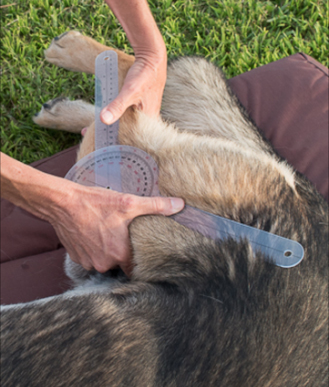 Many people ask “How long will my dog’s physical therapy take?” Physical therapy for dogs is the same as physical therapy for people! It depends on the reason for coming, the financial resources available, and the degree of improvement the owner desires. We want to help as many pets as possible and will customize a plan just for you. A solid rehabilitation program safeguard’s your surgical repair and typically saves the cost of repeated vet visits and long term medications for pain and inflammation.
Many people ask “How long will my dog’s physical therapy take?” Physical therapy for dogs is the same as physical therapy for people! It depends on the reason for coming, the financial resources available, and the degree of improvement the owner desires. We want to help as many pets as possible and will customize a plan just for you. A solid rehabilitation program safeguard’s your surgical repair and typically saves the cost of repeated vet visits and long term medications for pain and inflammation.
Canine rehabilitation sessions are covered on most pet insurance programs. For most cases, we like to start with sessions two or three times a week for the first month. As the patient progresses, the frequency usually decreases over the following month or two. Many of our canine rehab patients, once the rehab is complete, continue to come once or twice a week for our conditioning/fitness programs to stay in shape. We feel it is important to keep any body strong and fit. It decreases the potential for future injury, decreases the onset of arthritis, and increases your pet’s longevity and energy. We all want our pets to live a longer and healthier life!
Common Rehabilitation
- Post cruciate surgery
- Post-op elbow dysplasia
- Hip dysplasia
- Disk disease
- Soft tissue trauma
- Chronic diseases
- Amputations
- DM
- FCE/spinal stroke
- Post-op fracture repairs
Rehabilitation Pricing:
Rehabilitation Sessions:
Following the Initial Examination and Consultation with your veterinarian and surgeon (if applicable)…
- A rehab session with the rehab certified veterinarian $80
- Follow-up sessions with our licensed veterinary technician $70
If you are too distant to come to us for your rehabilitation needs, we still want to help and can offer you virtual rehab support with video calls, emails, and home exercise programs that change as your dog improves. Please contact us if you can’t make it to K9 Strong, but still want the best recovery possible for your dog or cat.
Danielle Bercier DVM CCRP
K9 Strong Rehabilitation & Conditioning
15828 South Blvd
Silverhill, AL 36576
Baldwin County Alabama Veterinarian
Office: (251) 945-7555
Cell: (850) 380-7973
Email: info@k9strong.org
New Client Form
(251) 945-7555 to make an appointment.


